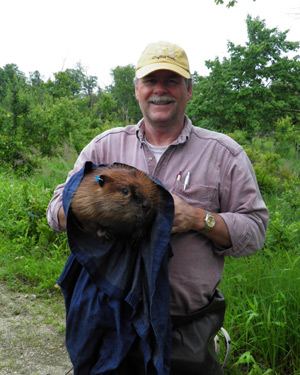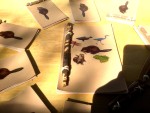Well yesterday was fun, with little messages of encouragement for our 10th year from folks around the globe. Now it’s time to get back to work. You know what they say, before anniversaries “Chop wood, carry water“, and after anniversaries”Chop wood carry water“. Or something like that.
Here are two articles that deserve our attention. I’ll start with the grating one first. Why is it every article written about Peter Busher annoys me more than it interests me? Over the years I have come to think he basically knows his beavers, but he honestly doesn’t seem to like them very much.
The Secret Sex Lives of Beavers
The population boom can raise alarms in communities. Beavers are often viewed as a nuisance, causing millions of dollars in damage each year by chewing fences, trees, and decks. They build dams, which leads to flooding of homes, crops, and railroads.
But some behaviors can be beneficial, says Peter Busher, a College of General Studies professor of natural sciences and mathematics and chair of the division. Beaver dam building expands wetlands, whose functions include filtering toxins from water, supporting biodiversity, and mitigating floods.

Busher has been studying beavers for four decades and was the first person to track the animals by tagging them with radio transmitters. He does his research in the Quabbin Reservation in Central Massachusetts, where 150 to 300 beavers constitute the nation’s longest-studied population, says Busher. Hoping to learn how humans can better coexist with beaver populations, he examines mating habits, birthrates, group structure, and how the animals migrate from one area to another. His findings could inform decisions about how communities respond to beaver activity and manage the animal’s population, both in Massachusetts and across the country.
Although beavers are among only 3 percent of mammals that are socially monogamous, raising their young exclusively with one partner, researchers do not know much about their pairing behavior. Do the parents also mate with other beavers and raise a mixed brood, or are they sexually exclusive? Busher wants to find out. He suspects that genetically monogamous beaver populations—those that tend to mate with one partner—increase more slowly and may stay in an area longer. If one of these populations were removed because of nuisance activity, he says, the area would likely be free of beavers for a while. But if the population were more promiscuous, new beavers could move into the area at any time; communities would then need to develop a long-term animal removal plan.
Promiscuous beavers? Honestly? Is that honestly what you think? Who thinks like that? Have you looked at every OTHER variable in their habitat that might differ between various beavers to rule out that food availability, or population, or stream gradient and prove that these it doesn’t influence which beaver are promiscuous and which aren’t? I’m sure, as a scientist, you would do ALL THAT before LEAPING to the assumption that DNA is responsible. I mean this is almost like race research.
How much trouble would you be in if you were posing that certain ethnicitys were more promiscuous?
The best research I have read on the topic described beavers as “opportunistic monogomists” – meaning if the right conditions happened to arise they would take advantage of them and mate outside the pair bond, and if they never arose it would be mostly okay with it and get on with the business of taking care of the family. I remember being amused when Rickipedia commented that this was pretty much the same for most male humans.
But Dr. Busher is trying to prove that it’s a beavers genes that make him roam. So that those prolific beavers we can kill more, and the faithful homebodies we can work with.
Are you sure you teach in Massachusetts? Because this theory is starting to sound positively republican to me!
The article that really interested me today comes from the irreplaceable George Monbiot and discusses the use of better language about ecology to capture public interest. Rusty of Napa sent it my way and I’m glad he did.
Forget ‘the environment’: we need new words to convey life’s wonders
If Moses had promised the Israelites a land flowing with mammary secretions and insect vomit, would they have followed him into Canaan? Though this means milk and honey, I doubt it would have inspired them.
So why do we use such language to describe the natural wonders of the world? There are examples everywhere, but I will illustrate the problem with a few from the UK. On land, places in which nature is protected are called “sites of special scientific interest”. At sea, they are labelled “no-take zones” or “reference areas”. Had you set out to estrange people from the living world, you could scarcely have done better.
The catastrophic failure by ecologists to listen to what cognitive linguists and social psychologists have been telling them has led to the worst framing of all: “natural capital”. This term informs us that nature is subordinate to the human economy, and loses its value when it cannot be measured by money. It leads almost inexorably to the claim made by the government agency Natural England: “The critical role of a properly functioning natural environment is delivering economic prosperity.”
I’m fully on board with the need to use language that enlivens and engages us rather than regulates our attention. But sometimes we are talking to politicians or biologists and need to convince them, and we think that kind of language carries more sway? Maybe it doesn’t. Maybe the only thing that matters to decision makers is what we celebrated yesterday: public pressure and votes. So engaging the public is more important than sounding objective.
This is my FAVORITE part.
On Sunday evening, I went to see the beavers that have begun to repopulate the river Otter in Devon. I joined the people quietly processing up the bank to their lodge. The friend I walked with commented: “It’s like a pilgrimage, isn’t it?” When we arrived at the beaver lodge, we found a crowd standing in total silence under the trees. When first a kingfisher appeared, then a beaver, you could read the enchantment and delight in every face.
Our awe of nature, and the silence we must observe when we watch wild animals, hints, I believe, at the origins of religion.
Something about that sentence feels very, very true for this woman who spent so many years in the company of beavers. (Not that we were silent the whole time.) Our beavers had train whistles and garbage trucks to get used to, and could handle a little talking. But there was definitely awed silence at times. Like when kits emerged or when an uncommon behavior was scene.
And it sure felt like the very best parts of church to me.
if we called protected areas “places of natural wonder”, we would not only speak to people’s love of nature, but also establish an aspiration that conveys what they ought to be. Let’s stop using the word environment, and use terms such as “living planet” and “natural world” instead, as they allow us to form a picture of what we are describing. Let’s abandon the term climate change and start saying “climate breakdown”. Instead of extinction, let’s adopt the word promoted by the lawyer Polly Higgins: ecocide.
We are blessed with a wealth of nature and a wealth of language. Let us bring them together and use one to defend the other.
Thank you, George for another beautiful column. I’m envious of the people who got to walk alongside you on the way to see those special Devon beavers. We very rarely feel reverence for what we consume or eliminate as inconvenient. But I have seen it time again on children’s faces watching our beavers.
Maybe its reverence, more than science, that protects nature.






































